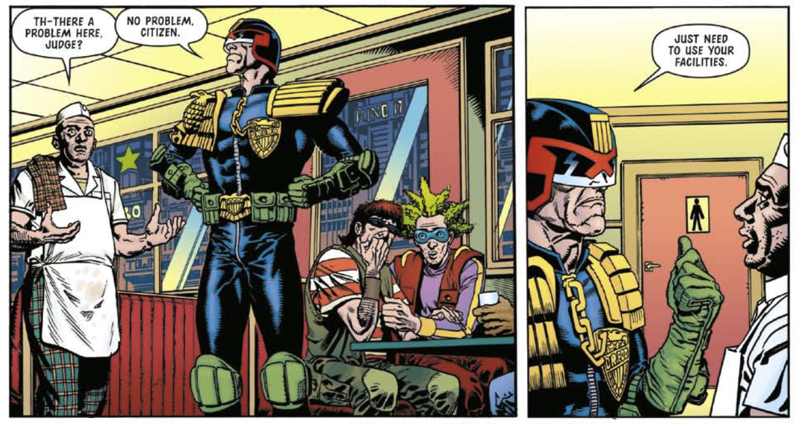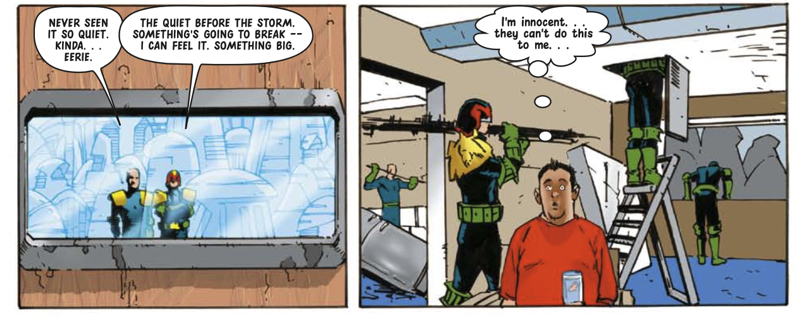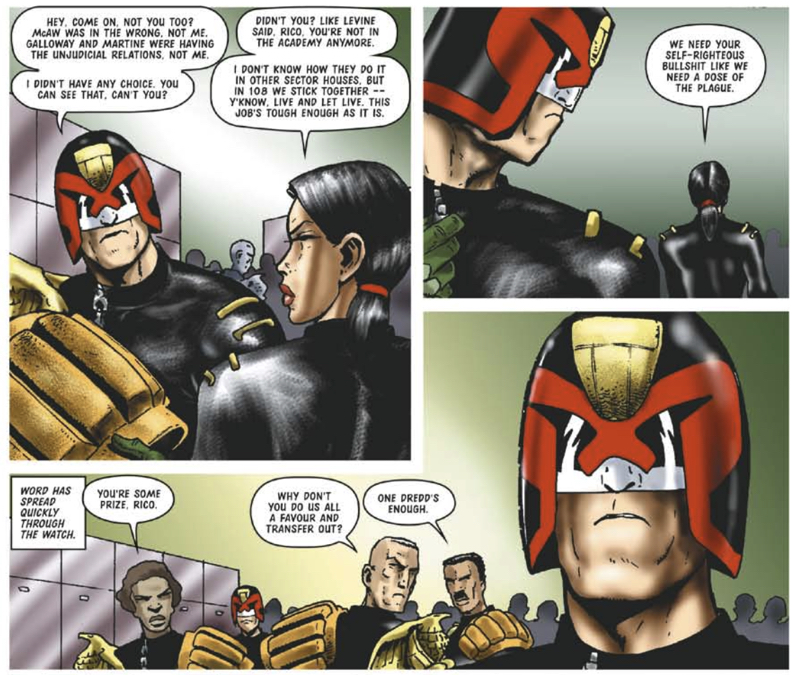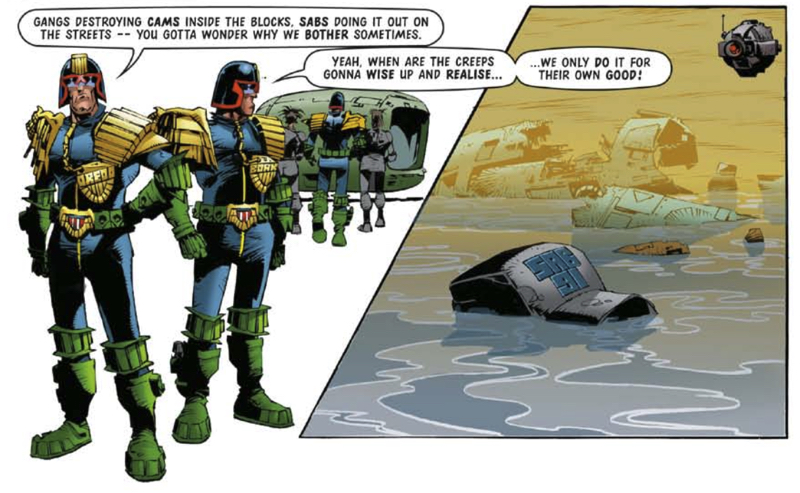Previously on Drokk!: When we last checked in with Judge Dredd: The Complete Case Files, we were surprisingly disappointed with the ways in which it felt… underwhelming and, at times, lesser than the history of the strip, perhaps? We put much of that down to the presence of Alan Grant in the writing credits, so what should we make of Vol. 32, which is predominantly the work of one John Wagner…?

Unusual Audio Note: Try as I might, I couldn’t get rid of a strange Doppler effect at times when I’m talking; it comes and goes seemingly without rhyme or reason, and isn’t present just on my audio track at all, but Jeff’s. I outright muted his audio in places, but it still shows up in places. Sorry; I hope it’s not too distracting.

0:00:00-0:03:01: A speedy introduction lets the listener know two very important things. Firstly, that we’re covering Judge Dredd: The Complete Case Files Vol. 32, which covers material from 2000 AD and Judge Dredd Magazine in 2000 and 2001, and secondly, that I’ve just had a chocolate bar before we started recording. Spoilers: only one of those facts is actually important to the podcast as a whole.

0:03:02-0:27:11: We get started pretty quickly, by talking about the “Sector House” storyline, and the “Blood Cadets” story that preceded it and set it up, as Jeff asks what my definition of “Mega-Epic” is — does an eight-part story count, especially if it’s by Wagner and Carlos Ezquerra? (No.) Before too long, Jeff is sharing his dislike of Simon Fraser’s art, his enjoyment of the retcon of Rico Dredd and potential reasons for his off-screen villainy, and we talk about what it might mean for John Wagner to finally be telling origin stories for Joe Dredd this far into the strip’s run. (I also mistakenly refer to the strip as having run for 13 years at this point, instead of 23 years; it’s not the only time I make that mistake this episode.) Also! Just how great is Carlos Ezquerra? We’ve already counted some of the ways, but here’s another one: his skill at making Rico look like a younger Dredd, yet still differentiating the two in simple, subtle ways so that it remains very clear who we’re looking at. He’s so good, everyone.

0:27:12-1:05:36: From the sublime to the… less sublime but still enjoyable, I guess? We spend a little more than half an hour talking about a bunch of other stories in the collection, and why we like them so much. The short version is, “John Wagner is very good at what he does.” This, of course, includes discussions on the art that we don’t like in the volume (Pete Doherty, Siku, we’re sorry), including a request for you, dear Whatnauts, to leave comments about whether Simon Fraser or Patrick Goddard’s art is most similar to 1990s Fantastic Four stalwart Paul Ryan. (It’s Goddard.) It also includes commentary on the nature of the Magazine stories, the return of P.J. Maybe, the fact that Alan Grant actually outperformed John Wagner on one particular trope this time around (and Jeff interrupting me to get to my point before I could, in a surprise turnaround on tradition), whether or not one story is a backdoor pilot for a series that never ended up happening, and much, much more. Most importantly, we finally learn what it takes to get Jeff to accept sentimentality in a Dredd story. Who knew dinosaur kids were his one weakness?

1:05:37-1:26:56: Things get meta for a period, as we discuss how difficult it is to talk about Dredd 36 episodes in, especially when a volume is good, but also filled with one-off stories that don’t contribute to larger plots or themes. Are we repeating ourselves when we say, as Jeff literally does here, “Fucking Wagner’s the GOAT”? Also: was Dredd as a property essentially self-sufficient and self-run by this point, because Wagner does so much of the heavy lifting and quality control by himself? Jeff references Thrill Power Overload, and I once again mix up 13 and 23 years, although Jeff does thankfully correct me this time around.

1:26:57-end: We wrap things up by mentioning our favorite stories — “Blood Cadets” and “Sector House” for both of us — and our least favorite (“Ghost in the Machine,” as Jeff rightfully points out, although “Ten Years” came very close for me), before teasing a less certain future for the strip as Wagner begins to withdraw slowly, and then mentioning the Twitters and the Patreon, as is our tradition. (We didn’t say it at this point, but had already established: this volume is Drokk, by the way, rather than Dross.) Be back next month for the worst cover of the entire Case Files series; as Jeff would — and indeed, does — say, “Bazinga!”


I didn’t read this volume, so I’m going a bit out on a limb here and say that’s Judge Dredd catching that child in the show notes and not a jimp from Ernie Wise Block.
So, I’m with Graeme McMillan on SABS. It’s great. In fact, I think that, for me at least, it’s not just about where Judge Dredd the character is now — it’s about where Judge Dredd the strip is now.
By “now,” I of course mean “about 2000.”
I think there might be a real risk for Wagner with Judge Dredd at this point, which is the risk of writing Judge Dredd stories. Dredd’s world is largely pretty fixed, and there’s this huge repertoire of things that Wagner can bring back and remix.
The problem is that an awful lot of that was the product of Thatcher’s Britain. Which, to be clear, is *my* Judge Dredd, and indeed my 2000 AD. But when you’re *in* 2000 ΑD, it was a long time ago, wasn’t it?
Wagner has had a hard time letting go. We had one Thatcher expy in McGruder. She’s gone. Then we had another one in Edgar.
But it’s more than referencing Thatcher specifically. Arguably, there’s a whole lot of stuff that in the ‘80s was brilliant, scabrous engagement with the world around 2000 AD, and now is — Judge Dredd stories.
This especially applies to policing, given what Judge Dredd is about. This is where Judge Edgar was such a misfire.
Britain is the liberal democracy that has most enthusiastically embraced mass surveillance in public places as a tool of policing. This is especially, although not only, true of London. It has been estimated that there is one CCTV camera for every 13 people in London — that may be an overestimate, but it is somewhere not far off that. The Underground alone has well over 15,000 of them. London is the only city to feature in the top ten most surveilled cities that is not in China. This happened in a relatively short period of time, most of it happening in the ‘90s.
By and large, the creation of Britain in which cameras were not far off being ubiquitous in public places was popular (a point to bear in mind with SABS — Wagner was not espousing a majority position), and a good bit before 2000 it had become *normal*, a part of life.
Judge Dredd has never before this caught up with that.
It is part of the basis of Judge Dredd that what Dredd does is normal policing. What Dredd does, specifically. Even though Dredd didn’t actually oppose Edgar’s department’s existence as such, the way she is used casts surveillance as something “other,” something represented by Dredd’s antagonist. One has a sense that she is supposed to represent the aspects of Dredd’s world that are modeled on East Germany and the like, not the aspects that are exaggerations of something more uncomfortably close to home.
So getting rid of Edgar in the previous volume is an important piece of deck-clearing for SABs, a story firmly aligns Dredd with public surveillance, and so moves the latter into the “normal” column. And for the first time in a long time, characterizes the judges in a way that doesn’t seem as if it were invented in 1985.
Of course, for us, 2000 was a long time ago, and in 2021, it perhaps seems more than a little quaint and charming that Wagner was so bothered by cameras in public places, which is a very crude kind of surveillance by our standards.
Late on this due to life stuff, but the best term I head to describe your difficulties discussing Wagner’s level of quality is the Golden Rut, though rut has negative connotations to it that don’t apply to Wagner, since he is constantly trying to find new angles and approaches to his work. I feel like Wagner and Dredd have entered the same space Stan Sakai has on Usagi Yojimbo, or the Hernandez Brothers, or Jim Aparo back in the 80s on Batman, or John Allison’s body of work, an consistently high quality but not flashy approach to simply doing the work at the highest level they can, to the point where it fades into the background of the industry churn. It is the kind of work that can immensly reward long time readers, but is the exact opposite of the shock of the new that drives so much attention. No one is suprised when the latest Usagi Yojimbo is rock solid, that’s like being surprised that water is wet.
It should be noted, though, that I remember people standing up and taking notice of Wagner and Dredd about a decade ago, starting with Origins, through the Tour of Duty sequences, culminating in Day of Chaos. So he has been able to break through to remind people how good he is, though all of those stories are big, attention grabbing stories, the exact opposite of what we saw in this volume.
I also note how there was concern in the last Drokk about Wagner getting rid of the supporting cast, since Rico 2 marks the point where Wagner fully locks in to building a supporting cast that he keeps around. It will stretch into the next case file or two, but it seems like he figured out what wasn’t working for him with the ensemble he had, and has worked out what he thinks a Dredd ensemble should look like, and how to make it sustainable.
There is something to be said about why the story options Rico 2 provide are more interesting to Wagner than those DeMarco offered. Perhaps he thought that the kind of reflections Rico 2 provokes in Dredd weren’t a threat to the long term sustainability of the strip that DeMarco was? Rico 2 makes Dredd reflect on the passage of time and how he’s mellowed, which still allows Dredd to go out and shoot people as the story requires. Whereas with DeMarco, the critique of the Judge’s inflexibility was always built around sex. There was more that Wagner tried to build out of that, where DeMarco’s original sin was always that she wasn’t a hypocrite about her sexuality, compared to Giant and the other judges who’ve had affairs and kids that we’ve seen over the years, and not the sex itself, which would have been horrifying. The concept has juice, but would require moving the strip to areas that were probably unsustainable, and Wagner may not have been equipped to handle. If you run Demarco’s arc to it’s logical end, eventually Dredd has to fuck. Is a Dredd who isn’t completely repressed even Dredd anymore?
There’s a lot to unpack about the acceptability of sex versus violence in media there that I’m not going to touch since this is already super long, but I find it fascinating that, in attempting to work out new wrinkles in the work while maintaining it’s ability to continue, Wagner ends up realizing that sex is the biggest threat to Dredd, and in a way that is outside the ability of the strip to engage with fully without irreversibly changing the character. Wagner can blow up Mega City One multiple times, he can have Dredd murder democracy activists on the streets, he can even destroy Dredd’s faith in the system, and the strip can absorb that and move on. Dredd having a crush on someone? Hell, Dredd having an emotionally healthy relationship with anyone? That would be like seeing Dredd take his helmet off, it would change something about the character, the larger readership would almost certainly reject it, and probably destroy the strip. And so it sits at the margins, sometimes a plot point in a story about Judges going bad, a constant reminder of the Judge’s failures, the final endpoint of Judge Minty’s “Maybe we should treat them with kindness” speech from the third or fourth casefile.
Finally got around to reading this, and it was pure drokk from start to almost finish. That last story about Wagner writing Dredd was a wet fart if there ever was one. The Sector House story was just great for all the reasons the hosts mentioned. I hope we see more of that caliber soon.
I was surprised how much I enjoyed this volume even those it was mostly one-off stories. I guess the balance is the Rico stuff does move Dredd’s story along in some regards, so that could have given me just enough of everything to be satisfied.
I do have a question though. How old is Dredd in the current strip? He’s gotting be in his 60s at least, right? Have the de-aged him or re-cloned him or something at some point?
Thanks for the comments from Voord and Jared. I’m not even British, but I remember the issue of the number of surveillance cameras in London being a hot-topic issue back in the late ’90s. In that context, the SABs story makes total sense. I will say from a presentation standpoint, Wagner tries very hard to trick us that they’re hardened criminals out on a typical heist, and maybe he didn’t play fair with the reader there. I can see both Graeme’s and Jeff’s sides on this story, but I did enjoy it. I did have to double check the badges on the judges in the last panel, because that definitely felt like a non-Dredd thing to say. I think, however, with a bit of editing, it could have worked as a Dredd line. If he had said something like, “Cits never recognize when they’re being helped,” or something to that effect, it would have been much more Dredd-like, and that much better.
Now to get caught up on the next case files!